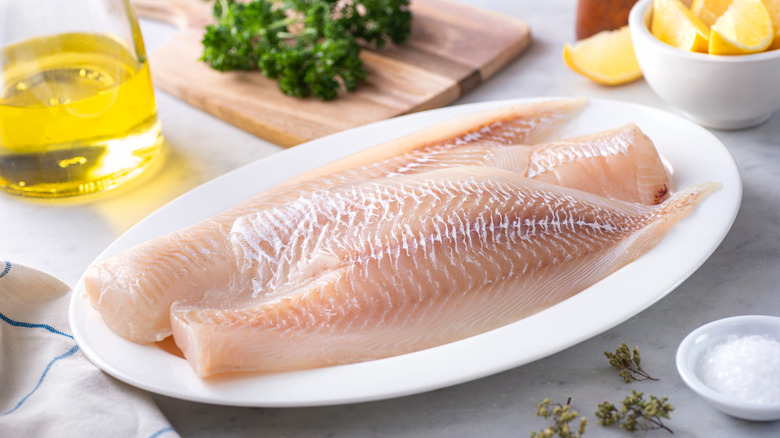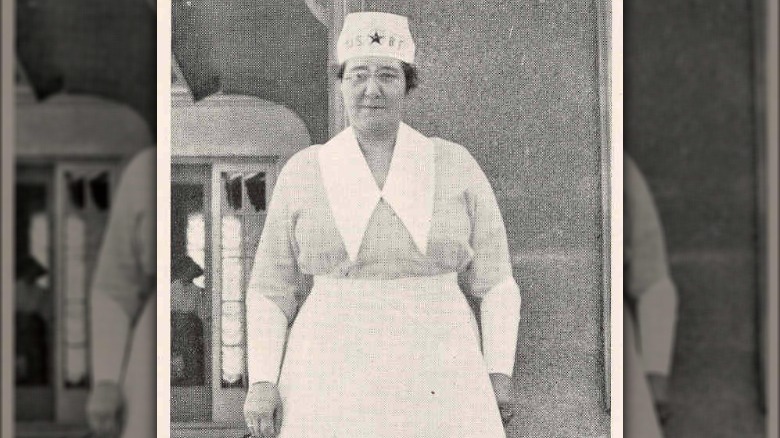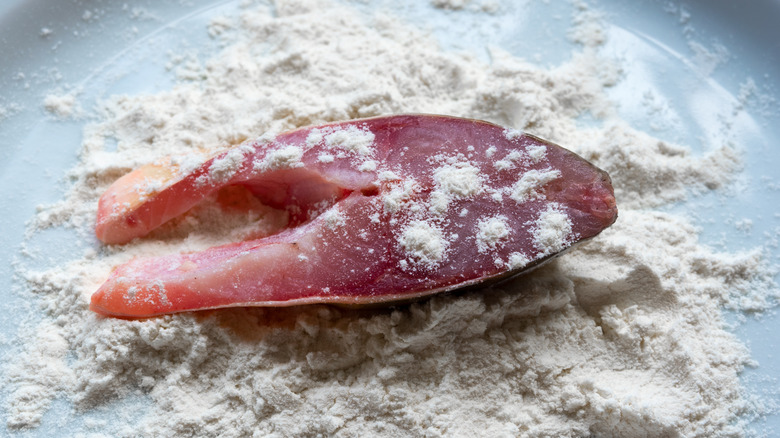How Evelene Spencer Convinced Americans To Eat More Fish During WWI
At the onset of World War I, food wasn't just plentiful in the United States, it was decadent. Farm fresh meats and vegetables, metropolitan restaurants, and packaged treats such as Oreos were abundant in the early 1900s, per The Takeout. Once America entered the first world war in 1917, however, the direction shifted from citizens imbibing to keeping the troops nourished and in fighting form and aiding the allies. The United States Food Administration was founded by Herbert Hoover and tasked with leading the change in consumer habits.
To ensure soldiers were fed well and plenty, propaganda was distributed to encourage Americans to cut back on meat, fats, sugar, and wheat. The mainstream popular term, "Meatless Mondays," can be traced back to this movement (via Together We Win).
Perhaps because the United States is greatly landlocked, meat consumption was an indicator of wealth at the time. Fish was seen as déclassé, and, believe it or not, lobster was saved for prisoners and the poor at one point (via The Smithsonian). To get Americans to put down the steak knife and start eating from the sea was no easy feat. Posters proclaiming, "Eat more fish — they feed themselves," were not going to cut it on their own. So what did the United States Food Administration do? They enlisted their own army of one: Enter Evelene Spencer.
Who was Evelene Spencer?
Originally from Toronto, Canada, Evelene Spencer immigrated to the United States at 20 years of age when she married her husband, Joseph, in Oregon in 1888. When the United States Bureau of Fisheries came knocking on her door in need of help putting seafood on the popularity map, she was the manager of a restaurant in Portland with two young daughters.
At the time, Americans had no idea how to cook fish. Evelene was tasked with traveling the country and doing live cooking demos to teach Americans the basics and garner a higher interest in fish. You could say she was the original pop culture food celebrity long before there was cable T.V. and fervent fanbases.
Evelene served as an outreach specialist for the United States Bureau of Fisheries for seven years and earned the respect and recognition of many in both the United States and Canada, eventually crowned with the moniker "Fish Evangelist" (via U.S. Fish & Wildlife Service). While many may not be able to pick out a picture of Evelene in a lineup today, she became the face of fish at the time. She left a lasting legacy of popular dishes and methods that most are unaware can be attributed to her.
A lasting legacy
Evelene is believed to have shared one of the first published accounts of Cioppino, per The Kitchen Project, shared in her comprehensively-named cookbook, "Fish Cookery, Six Hundred Recipes for the Preparation of Fish, Shellfish and Other Aquatic Animals, Including Fish Soups, Salads and Entrees, with Accompanying Sauces, Seasonings, Dressings, and Forcemeats."
Perhaps she should be remembered for inventing the "Spencer method of frying," or, as we know it, oven-baked. According to a 1922 article published in The Sunday Oregonian (via the University of Oregon), she aimed to save time and money for those with many mouths to feed by eliminating eggs and the need for individual pan frying. She may even be credited with the efficient method of keeping wet and dry hands separate during dredging, per her instructions in the article.
Some of her recipes involved not commonly consumed seafood, such as whale. Whale steak dipped in breadcrumbs and onion juice, cubed and curried whale stew with Worcestershire sauce, and a 3 lb. whale pot roast with gravy. These may not have become a dining mainstay, but her effort is still recognized (via the U.S. Dept. of Commerce, Bureau of Fisheries). On the other hand, her inclusion of the not-so-popular skate in classic crab salad may be worth adding to today's summer salad repertoire, per CKBK.
You may say Evelene did for fish in America what Julia Child did for French cuisine — studied it and made it accessible, doable, and exciting for the masses.


